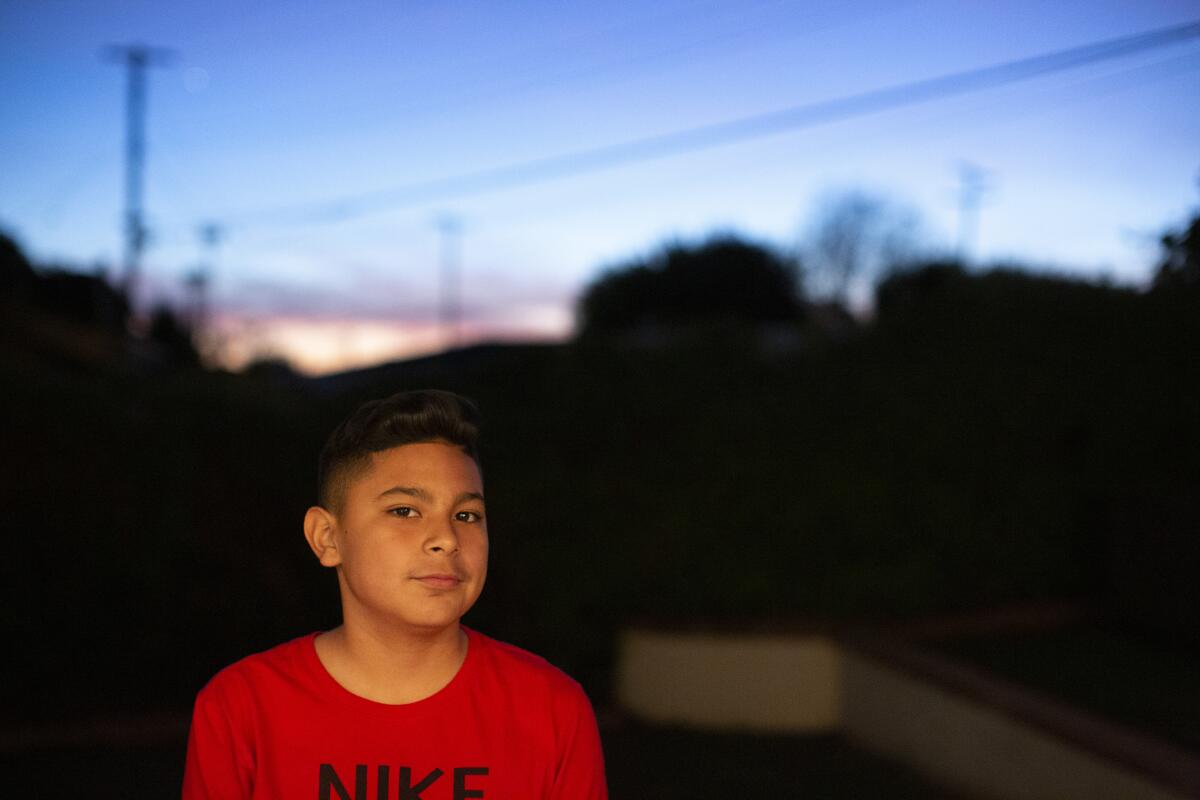The puppy was cute and expensive. And then it died
- Share via
The Loy family realized pretty quickly that something was wrong with their new puppy, a red-brown bundle of fluff they christened Penny.
But they could not have imagined how much trouble they were in for when they drove into the parking lot of a Tijuana’s Tacos restaurant in Pomona to take possession of a 9- to 12-week-old miniature goldendoodle.
They’d found Penny online and fallen in love. They’d shelled out $1,200 cash in March 2018 for what they thought was a pure-bred designer dog, healthy, happy and hypoallergenic. Half the money came from then-10-year-old Manuel, who earned it sweeping floors in his father’s barbershop. It cleaned out his entire savings.
They eventually found out that the sellers belonged to a Phelan family whose matriarch had been the target of an FBI sting, pleaded guilty in 2011 to a federal fraud charge and was sentenced to 41 months in prison for selling sick and abused horses over the internet.

But first the Loys had their hearts broken.
Penny, it turned out, wasn’t a girl. They renamed the puppy Bear and rolled with it. But he also wasn’t a goldendoodle — half golden retriever, half poodle. Instead, a veterinarian told the family, Bear was, maybe, a Maltipoo — equal parts Maltese and toy poodle. His fur wasn’t red-brown either; the dye began to wash off during his first bath in the Loy’s La Habra home.
All that was bad enough, but it got worse. Bear was only about 4 weeks old — way too young to have been taken from his mother. And he was very, very sick.
Jessica Loy is one of nine people who filed suit against the Kenney family Monday, charging that Trina and Rick Kenney and their children Elijah and Jezriel allegedly operated what the lawsuit described as “one of the worst animal peddling operations in the country — the sale of sick and diseased puppies over the internet.”
The families ended up spending thousands of dollars — on the animals, on veterinary bills, on sanitizing their homes after the dogs were diagnosed with parvovirus or distemper, on replacing furniture fouled by ailing pets who vomited or had diarrhea.
Some paid to put their dying puppies down to end their suffering. Then, they covered the cost of cremation.
Of the seven puppies named in the suit — Bear, Winnie, Teddy, Ruffles, Charlie, Stella and Sicily — none were healthy. They weren’t vaccinated, though the Kenneys supplied records of the dogs’ alleged immunizations, according to the lawsuit. They also weren’t goldendoodles or labradoodles as the Kenneys allegedly claimed in ads on Craigslist, Recycler.com and other internet sites. Four were not the sex promised.
Ruffles was surrendered to his veterinarian by his new owner, Ramtin Mehrvijeh, because Mehrvijeh couldn’t afford to save the puppy’s life. Treatment for parvovirus would have cost $6,000, according to the lawsuit, money the West Hollywood man just didn’t have.
Three of the dogs died.
The Kenneys could not be reached for comment. The Times called 19 telephone numbers listed in various public records as belonging to family members. Most were disconnected, not accepting calls, or were not answered. No messages were responded to.
“We want them to refund the money and get out of town,” said Gary Praglin, a Santa Monica-based attorney who is representing the families. “Don’t sell any more dogs. Stop hurting people.
“When a kid watches a puppy die,” Praglin added, “that’s a tragedy.”
Yes, Bear died. But first, he suffered.
As the Loys — Jessica; husband Anthony; their daughters, Mariah and Isabella; his daughter, Lali; and her son, Manuel Aguilar — waited in the Tijuana’s Tacos parking lot, they say they saw a man they now know is Elijah Kenney drive up in a brand new white Mercedes Benz. As he got out of the car and approached them, Loy said, he was holding two red-brown puppies in his arms, a male and a female.

“We agreed on a girl,” Loy said. “They were so little. He said he only accepted cash. He gave us what appeared to be some kind of shot record. We knew nothing about puppies. We trusted him. On the way back to the freeway, less than 15 minutes later, the dog had diarrhea. Right away we texted them, ‘Is the puppy OK?’”
The response was comforting, Loy recounted: “Puppies, when they first leave their mothers, become homesick. It’s normal. Take her home. If there are problems, let me know.”
Back home in La Habra, the puppy still known as Penny wouldn’t eat or drink and kept vomiting. The next day, she continued to throw up and have diarrhea. Loy asked Manuel and Lali if they wanted to give Penny a bath. They took the tiny animal to the kitchen sink, got some dog soap and started to scrub.
“It was a reddish-bronze color all over our hands,” Manuel said. “It was kind of weird.”
When they took Penny to the vet the first time, they found out she was a he. The vet gave the newly named Bear fluids and suggested the family contact the sellers and get a different dog.
“They told us, ‘Oh, my gosh, I’m so sorry. If you have medical bills, we’ll be happy to help,’” Loy said. “The second night was really bad. The dog wouldn’t eat, wouldn’t drink, had diarrhea, was vomiting, wasn’t playing, was falling, walking, collapsing.”
The second veterinarian visit involved tests and antibiotics and more fluids. Bear was diagnosed with parvovirus, a highly contagious disease that is often fatal if left untreated. The vet told the family they could try taking Bear to an animal hospital, but it would cost at least $3,000. Loy said the vet added: “I can’t guarantee the dog’s going to live.”
Anthony Loy texted the sellers: “Hey, the dog has parvo.”
They texted back, Loy said: “You’re lying. Show us proof.”
Bear could barely breathe. He couldn’t walk in a straight line. He yelped in pain when he lay on his back. The vet recommended the family have him euthanized. They agreed. First, though, the children said goodbye.
“I didn’t really want to look at him that much,” said Manuel, who is now 11. “It made me sad. I touched his stomach. It was so hard for him to breathe. I was crying.”
When the family contacted the Kenneys, they were harassed and brushed off, according to the lawsuit and texts Loy has kept. In one exchange, a woman Loy identified as Trina Kenney texted: “find me :) I’ll defend myself You never ended up buying a dog from us.”
The Kenneys are not strangers to local officials.
In April 2018, representatives of the San Bernardino County Sheriff’s Department, the San Bernardino Valley Humane Society, Rancho Cucamonga Animal Control and San Bernardino County Animal Control inspected the Kenney’s Phelan property. They had a search warrant.
According to the complaint: “Dogs at the location were over density, however animal control took all the dogs at the time of inspection, so there was no longer a violation.” News reports said officials were investigating a breeding and sales operation and had confiscated 32 dogs, including 17 puppies, that needed veterinary care.
It is unclear whether anything came of the investigation. No charges have been filed. San Bernardino County Sheriff’s Deputy Randy Stanley said law enforcement agents went along and helped serve the search warrant because the Humane Society did not have sufficient manpower.
“They did have some dogs there,” Stanley said. “It was a fairly nice residence. I never got into the animal cruelty part of the investigation.”
Representatives of the San Bernardino Valley Humane Society and San Bernardino County Animal Control did not respond to requests for comment.
On Monday, when the lawsuit was filed, Loy said the family had no plans to get another puppy, that the last year or so has been too painful. She’s glad, she said, that others have come forward, that “someone is trying to help us and we’re not alone.”
Manuel, though, still has questions. If he could, he said, he’d ask the Kenneys, “Why would you do this to a person? Why would you do this to a dog? It’s pretty messed up.”
That’s what he wants to know, he said. “Just why.”
More to Read
Sign up for Essential California
The most important California stories and recommendations in your inbox every morning.
You may occasionally receive promotional content from the Los Angeles Times.











